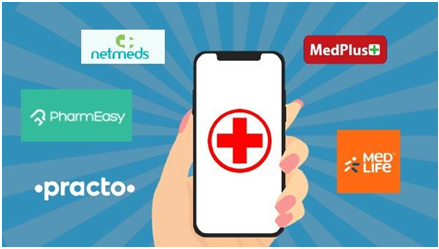Online sale of drugs in India
Context: In early February, the Ministry of Health pulled up at least 20 companies including Tata-1mg, Apollo, PharmEasy,Reliance Netmeds and Amazon by issuing them a show cause notice, for selling medicines online.
This happened after the All India Organisation of Chemists and Druggists (AIOCD), a powerful lobby of over 12 lakh pharmacists, threatened to launch a country-wide agitation if the government didn’t act.
Is banning e-pharmacies a viable option?
- The Ministry of Health has adopted a ‘blow hot blow cold’ approach towards online pharmacies.
- The acute need for door step delivery of drugs was felt during COVID-19. The year of 2020 marked a watershed moment for the growth of e-pharmacies as the Ministry of Home Affairs issued orders for them to continue to operate.
- It saw nearly 8.8 million households using home delivery services during lockdown.
- Banning e-pharmacies would not be a viable option. There is a possibility that some of these businesses will go underground if banned, because people are not going to stop ordering medicines online anytime soon.
- The draft e-pharmacy rules, which were originally intended to whip e-pharmacy businesses into shape, were floated by the Ministry of Health in 2018.
- The rules were finalised, public comments were taken into consideration and they were almost on the brink of being notified.
- But the proposal was abruptly shoved into cold storage, after being referred to a Group of Ministers including Amit Shah (home) and Rajnath Singh (defence) as the matter was considered ‘sensitive,’. It ran the risk of irking a substantial vote bank of offline pharmacists.
- Since then, multiple court orders including those from Bombay, Madras, Delhi and Patna High Court have called for regulating e-pharmacies.
- The latest in the line is the 172nd Parliamentary Standing Committee report released in June last year, which found it ‘appalling,’ that e-pharmacy rules had not been notified even after four years of the draft being introduced.
How are e-pharmacies harming offline stores?
- Flush with billions of dollars of private equity money to infuse, e-pharmacies made a bang in the market in 2015 and started offering hefty discounts on medicines in a bid to garner more market share.
- E-pharmacies call themselves facilitators of doorstep delivery. They claim tie-ups with retail chemists for vending medicines.
- However, since profit margins in the drug retail industry are very thin, just about 15% to 16%, every player in the supply chain is struggling to make money.
- Therefore, companies like PharmEasy, in a move to circumvent retail chemists are building a supply chain from the ground up by buying out big and small wholesale drug distributors like Ascent Health, Desai Pharma, Eastern Agencies Healthcare among others.
- Reliance bought out a Bengaluru-based software company C-Square Info Solutions, which caters to the software needs of local pharmacists for the past twenty years.
- But this aggressive growth is coming at a cost. It is to be noted that since 2015, e-pharmacies have recorded losses year-on-year. Tata-1 Mg posted a loss of ₹146 crore in FY22, whereas PharmEasy’s losses widened to ₹2,700 crore in the same fiscal.
What next?
- Both e-pharmacies and offline retail pharmacists have realised that in a climate where drug delivery is driven by consumer sentiments, it is futile to stick to any one way of doing business.
- In the past eight years, the market penetration of e-pharmacies has seen single digit growth from 3% to 5%.
- It is just one additional option for consumers for buying chronic care medicines
- This has led e-pharmacy players to now open capital-intensive brick and mortar stores.
- Until March 2021, Reliance had opened 114 pharmacies inside their Smartpoint grocery stores. It plans to open 2,000 more outlets.
- Apollo Pharmacy which has nearly 4,000 physical stores also caters to online sales. PharmEasy has close to 600 of its own stores while Tata-1Mg has over fifty stores and is adding more.
Stiff competition has forced mom and pop pharmacists to also offer home delivery options to their customers by introducing their own store apps. In an ecosystem that is moving towards a hybrid mode, all eyes are on the Ministry of Health which will have to effectively regulate the new way of doing ecommerce in the drug space.
| Practice Question
1. Is it viable to ban online medicinal companies to protect the interest of offline stores? |




